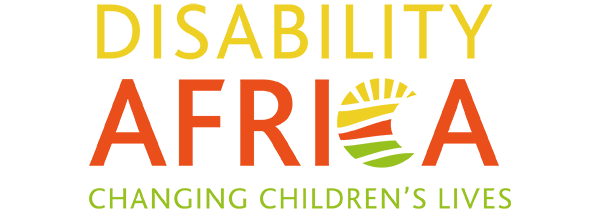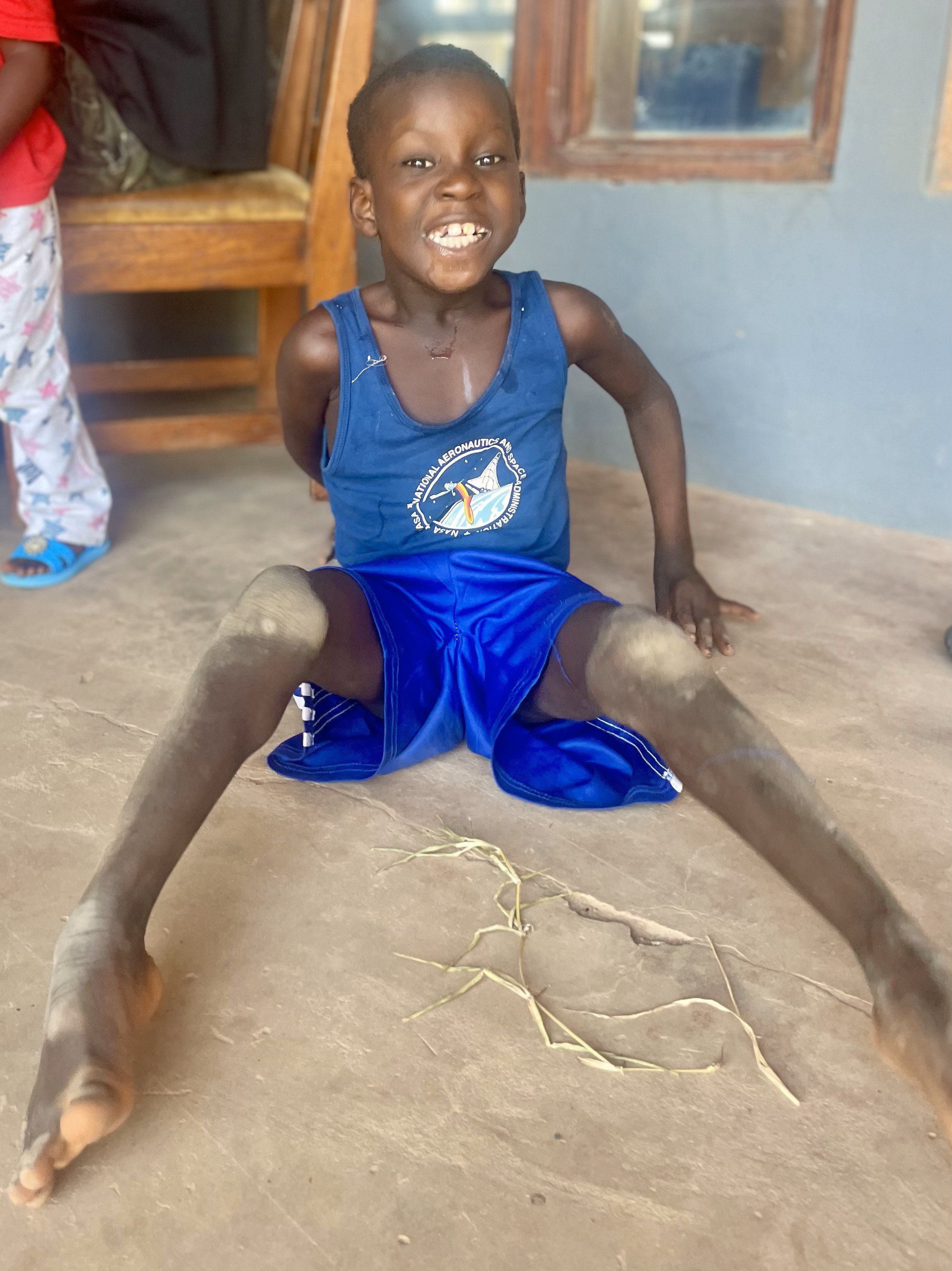Recorded Service Delivery by Disability Africa, up to December 2024
OUR IMPACT
We have been developing our play centered model since 2011, delivering over 90,000 visits to over 700 children during this period. As our delivery continues to grow, and our reach expands, we are pleased to report on the significant impact of our interventions within the communities in which we operate so far. Some examples of positive impact across our key target areas include…
SOCIAL INCLUSION, MENTAL HEALTH & WELLBEING
Parent speaking about the The Gunjur Inclusion Project Play Team.
Over 700 individual children at risk of isolation have enjoyed ongoing access to a fun and nurturing social space where they can play and make friends. Staff and parents have noted considerable change in the wellbeing and confidence of their children attending our play projects. Children who were withdrawn and isolated are now making friends, laughing and enjoying life.
The immense benefit of social inclusion is evident in the case of “S”. S is a young girl from Kenya who has Cerebral Palsy, which causes her to have difficulty walking and using spoken language. Her parents abandoned her as a baby, but she was ‘rescued’ by her grandparents. When we met her, she was living an isolated life in a rural family home with very few resources, no friends or social community. Our Team at the Malanga Inclusion project began visitIng the house and registered her to join the playscheme. She now attends the playscheme where she enjoys singing, dancing and watching other children. Staff have observed incredible improvements in her independence and wellbeing. “S” has made many friends and can even now feed herself and walk, with support.
Parent at the Kawama Inclusion Project
A Representative from the Disability Community at a Community Land Dispute Meeting in The Gunjur
RIGHTS OF DISABLED CHILDREN
Our playteams work hard to safeguard and uphold the rights of disabled children. Staff members, from playworkers to caretakers, have evolved into powerful advocates for inclusion within their communities.
An example of the importance of advocacy can be shown in the case of “C”. “C’” had been absent from playscheme , so the Malanga Inclusion Project Team visited the home and found C alone and unattended... This was worrying because C does not use spoken language and their home is quite far out in the bush – her parents had left her alone to farm their land. Japhet - Project Director - met with the grandmother to explain the importance of including C at the playscheme, where she can be better supervised and associate with friends. Thanks to the team advocating for her safety and standing up for her right to play, C is no longer left alone all day, but is safely supervised at her local playscheme.
Beyond the walls of our playschemes, we have also seen signs of greater inclusion and representation of disabled people and their families in the wider communities. Whereas previously they were often ostracized and excluded from decision making , we have seen targeted efforts of communities to include disabled people and their families in community life. For example, in Gunjur, The Gambia, our Community Liason- Bue, is often contacted to facilitate representation from the disabled community at important meetings.
EDUCATION
“Kaddy” at her first day of preschool
Playschemes provide a safe, stimulating and supportive educational environment for children to learn. Across all projects we have witnessed examples of incredible progress in the development of children accessing our playschemes.
Our projects are also ending education exclusion by developing free access routes into appropriate education environments for our disabled children, and supporting them to stay in school if issues arise…
In The Gambia, we've partnered with Gambian School Support to sponsor the transition of disabled preschool-aged children into a highly reputable local pre-school. Disability Africa’s playteam facilitates the transition and regularly delivers monitoring visits to review the children and upskill support staff. The four children currently on the program are thriving, with one child even learning all their phonics sounds in two weeks.
The incredible journey from isolation, to play, to school, can be seen in the case of “J”:
J enjoying himself at Playscheme
Due to his cerebral palsy and cognitive impairments, J was kept at home, and never learnt to walk or communicate. In March 2024, J’s life changed when our social worker registered him to be transported to our playscheme twice a week. At playscheme, J began to practise moving with a toy bike, so was referred for a walker, orthopaedic boots and physio. In January 2025, J took his first independent steps. He started to use sign to communicate with play-staff, and improved his motor skills by building Lego. Noticing his capacity to learn quickly, the play team secured sponsorship for J to attend a local preschool. He is now zooming around school with his friends, and learning to read and communicate verbally, proving to his community that his potential is limitless.
Miriam, in the Gambia, displaying her recent creation.
The success of Disability Africa’s Playschemes in local schools in Malanga, Kenya, has lead to The Kenyan Government building on our progress, to develop a special education unit in partnership with one of our playschemes. Disabled children can now come to Bahati Playscheme to receive a combination of play based activities and inclusive education from special education teachers.
In certain cases, we have also supported older children from our playschemes to pursue further vocational training, with excellent outcomes. For example, Miriam in the Gambia is being supported to attend a dressmaking course, where she is excelling at her craft and beginning to earn her own livelihood.
MEDICAL SUPPORT
We have delivered over 3,000 medical support visits and over 800 physiotherapy sessions. Working with medical professionals and partner services, our medical support officers work tirelessly to deliver lifesaving medical care, mobility support and surgery.
Buba – the Medical Support Officer (MSO) in The Gambia – recently coordinated orthopaedic surgery for four children. Buba makes sure the after-care is in place – ensuring dressings are replaced and that wounds are kept clean. Then, of course, making sure that the children return to the playscheme when they are able. Buba reports that one child, having recovered from a leg injury, is already cycling to the playscheme.
Physiotherapy Sessions at The Kawama Inclusion Project
Our Medical Support teams offer crucial support in identifying a child’s need and helping families to access appropriate support. Abigail, The MSO at the Kawama Inclusion Project, who is a trained nurse from Ndola in Zambia, discovered 3 children with undiagnosed epilepsy. So, she set up appointments for the children and their parents and a range of tests including scans. Abigail also supported parents with practical information and - crucially - reassurance about the management of the condition and connected the families with a local NGO who supplies free epilepsy medication.
Project Playworker
Food Delivery to a parent in Kawama, Zambia
PARENT SUPPORT
The most effective way to ensure a disabled child’s wellbeing, is to ensure that their parents are supported , informed and well resourced. We have delivered over 1,500 family support visits, and 900 parent support meetings, making sure that parents feel supported and connected within their communities.
The Case of ‘G’ illustrates how vital the support we provide to families is. ‘G’ is a 10 year old girl with a complex impairment known to the Gunjur Inclusion Project. On a home visit Buba – the Medical Support Officer – found that she was severely malnourished. Her impairment means eating and drinking is difficult, takes a long time and her care is difficult to manage for her mother on her own. When G was discharged the team increased the home visits – as she was too weak to attend playscheme – and increased delivery of food support to make sure mum has enough food. Buba continued to monitor G’s health and make sure the hospital’s advice was followed – especially keeping G hydrated. As well as monitoring the girl’s welfare, the mum needed support and information and not a small amount of encouragement with such a significant task of caring on very few resources. G gained over 10kgs in weight and is now healthy and attending our playschemes.

























